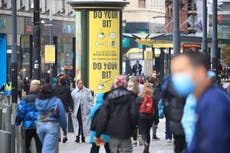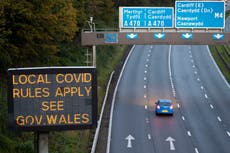Coronavirus: Boris Johnson faces having to impose tier 3 restrictions on Greater Manchester as standoff continues
Workers set to lose their jobs must be given same income guarantee as in March, ministers to be told
Your support helps us to tell the story
From reproductive rights to climate change to Big Tech, The Independent is on the ground when the story is developing. Whether it's investigating the financials of Elon Musk's pro-Trump PAC or producing our latest documentary, 'The A Word', which shines a light on the American women fighting for reproductive rights, we know how important it is to parse out the facts from the messaging.
At such a critical moment in US history, we need reporters on the ground. Your donation allows us to keep sending journalists to speak to both sides of the story.
The Independent is trusted by Americans across the entire political spectrum. And unlike many other quality news outlets, we choose not to lock Americans out of our reporting and analysis with paywalls. We believe quality journalism should be available to everyone, paid for by those who can afford it.
Your support makes all the difference.Boris Johnson faces having to impose the harshest tier 3 restrictions on Greater Manchester, after his offer of extra cash help was rejected as too little.
As the stand-off between the government and local leaders continued, Downing Street warned that intensive care units (ICU) could be overwhelmed by Covid patients in the city by 12 November, even if hospital managers release surge capacity.
Ministers are locked in talks with local leaders, even as the area’s hospitals run out of beds – and are dangling a package worth about £75m for councils and businesses to win agreement for the crackdown.
But Sean Fielding, the Oldham leader, insisted it would not be acceptable unless workers set to lose their jobs are given the same income guarantee as during the original coronavirus lockdown.
“We don’t see why people should be expected to live on less money than they did back then,” he warned ministers.
In today’s talks, the government will be told that workers must receive 80 per cent of their normal pay – including the self-employed – and Greater Manchester is also holding out for bigger grants to businesses.
“You are asking people to do the same thing, so people should expect the same compensation,” Councillor Fielding told BBC Radio 4.
In areas entering tier three restrictions, 67 per cent of wages will be paid by the government – but, crucially, only where firms are ordered to close completely.
Louise Casey, a former homelessness adviser has warned that people face “destitution” and may have to “prostitute themselves” without more Covid help.
Andy Burnham, the Greater Manchester mayor, was defiant, saying there were no meetings “in the diary” and urging “parliament to intervene”.
“Nothing has changed as far as I’m concerned. It’s not about the size of the cheque,” he said – also demanding proper support for full-time workers.
Downing Street said that conversations with regional leaders were “continuing” and restated Mr Johnson’s warning that he was ready to impose restrictions if they could not be agreed voluntarily.
The PM’s official spokesman said that hospital admissions for coronavirus in Greater Manchester were doubling every nine days and positive cases involving the more vulnerable over-60 age-group had trebled in 15 days from 89 per 100,000 population on 27 September to 282 on 12 October.
Numbers of Covid-19 patients in ICUs in the city had reached 40 per cent of the level at the height of the first wave in the spring and the number is expected to rise “significantly” over the coming weeks, he said.
On the assumption that rates will double every 14 days, Greater Manchester’s ICU capacity can be expected to be used up by 28 October. By 8 November, Covid patients alone would entirely fill ICU beds.
Even if hospital managers implement “surge” measures to free up more intensive care beds for coronavirus patients, capacity will be reached by 12 November, said the PM’s spokesman, though this does not include spaces in Manchester’s Nightingale field hospital, which has been put on standby.
“If at all possible, we do want to engage constructively with Greater Manchester and agree on a way forward,” said the spokesman.
“But, as the prime minister said on Friday, if agreement can’t be reached we will need to intervene to protect hospitals and save lives of residents. Efforts will be more effective if we can work with local authorities.”
Ministers have twice stepped back from imposing tier 3 on Greater Manchester – fearing people will not comply unless there is local backing – but Robert Jenrick, the local government secretary, hinted patience is wearing thin.
“I think the discussions have been productive but they have probably gone on too long now,” the Cabinet minister said.
“I am hopeful that we can reach an agreement, but we do need to conclude this now. There has been a sense of uncertainty, which isn't helpful to people living in Greater Manchester.
“More importantly, the number of cases is rising and the pressure on some of the hospitals in Greater Manchester is there for all to see. So, I think further measures and action now is important.”
Mr Burnham has accused the prime minister of exaggerating the situation, arguing that intensive care units are only at a quarter of their April peak with cases had been falling in Manchester for several days.
But a leaked NHS document revealed that some of the region's 12 hospitals – in Salford, Stockport and Bolton – are already full.
Up to 7 million more people could go into the tier 3 “very high” level this week, with South Yorkshire, West Yorkshire and Nottingham all potentially moving up.
The two Yorkshire conurbations look closest, with local leaders – as in Merseyside and Lancashire – not believed to be holding out for 80 per cent of wages.






Join our commenting forum
Join thought-provoking conversations, follow other Independent readers and see their replies
Comments